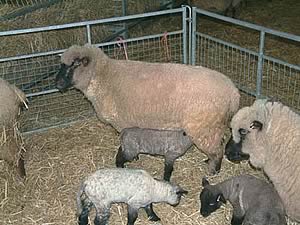 |
|||||||||
|
|||||||||||||||||||
|
|
Advice to pregnant women during
the lambing season The Department of Health, the Department for Environment, Food and Rural Affairs, and the Health and Safety Executive advise that pregnant women should avoid close contact with sheep during the lambing season.
Pregnant women who come into close contact with sheep during lambing may risk their own health and that of their unborn child, from infections that can occur in some ewes. These include chlamydiosis (enzootic abortion of ewes - EAE), toxoplasmosis and listeriosis, which are common causes of abortion in ewes. Although the number of reports of these infections and human miscarriages resulting from contact with sheep is extremely small, it is important that pregnant women are aware of the potential risks associated with close contact with sheep during lambing. To avoid the possible risk of infection, pregnant women are advised that they should:
Pregnant women should seek medical advice if they experience fever or influenza-like symptoms, or if concerned that they could have acquired infection from a farm environment. Farmers have a responsibility to minimise the risks to pregnant women, including members of their family, the public and professional staff visiting farms. Any action should be determined by their risk assessment required under the Control of Substances Hazardous to Health (COSHH) Regulations 2002 and also the Management of Health and Safety of Work Regulations 1999. If a ewe aborts, farmers are advised to consult their veterinary surgeon and arrange for samples to be examined at their local Regional Laboratory of the Veterinary Laboratories Agency to determine the cause. In the interests of hygiene, farmers should dispose of all afterbirths promptly and safely in accordance with relevant legislation. The EU Animal By-Products Regulations 2002 requires animal by-products, including afterbirth material, to be disposed of via an approved route such as rendering, incineration, knackers yards etc.
|
||||||||||||||||||

|
|
||||||||||||||||||
| home | agri-services | pedigree
pen | news | dairy | beef | machinery property | organisations | site map |
|||||||||||||||||||

